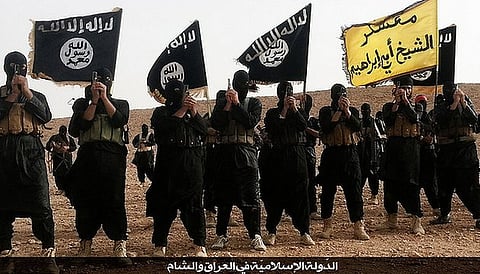Syria weathers a year of Daesh brutality
US intelligence agencies acknowledge that the terrorists remain as powerful today as they were in mid-2014

There is nothing remotely funny about the Daesh ( the self-proclaimed Islamic State of Iraq and the Levant) phenomenon that boasted vast claims ever since the self-appointed ‘caliph’ Ebrahim Al Baghdadi (better known as Abu Bakr Al Baghdadi) appeared in a Mosul mosque to proclaim the restoration of the Caliphate. Whether any of its achievements qualified for the glorious category will long be debated, though the boldly issued “price list” to sell children, young girls and women for use as sex slaves for the pleasure of its fighters cannot, by any stretch of the imagination, be divinely sanctioned. It is impossible to know this, of course, but no deity will condone to sell boys and girls aged one to nine for about $165 (Dh606), an adolescent girl for $124, and women over 20 years of age at even cheaper rates. Yet, this is what Daesh glory passes for these days, an achievement that appeals to brainwashed followers that would have shamed the world’s leading propagandists, from the Nazi Joseph Goebbels to all of his contemporary successors who manipulate at will. Al Baghdadi is surely of the same ilk.
Yet, and this must be spelled out as clearly as possible, Al Baghdadi is not alone in this business and those who shed crocodile tears at the vast devastation in Iraq and Syria in particular, bear specific responsibilities too. Indeed, while a coalition of leading countries launched indefinite military campaigns against extremists without actually declaring war or putting enough resources to quickly subdue them, it is fair to ask about their intentions. A year after the latest attacks, what happened to the billions of dollars allocated to fight them? Where are the results of the thousands of bombs dropped? What was the thinking behind training 60, yes only 60 revolutionaries — disrespectfully dubbed as “rebels”— who could be vetted for a train-and-equip programme? What about the thousands of civilians who will now be killed?
Grave humanitarian conditions
In fact, and as readily acknowledged by US intelligence agencies, Daesh remains as powerful today as it was in mid-2014. It can replace fighters faster than any other military organisation on earth, which begs a simple question: how is that possible? Are we talking about an endless pool of suicidal fighters who need to be recruited, trained and deployed to various battlefields over which they enjoy no air superiority or secure supply lines?
Bombing the same spots for decades on end seems to be favourite activities, even if doing so seldom works. We now have grave humanitarian conditions to contend with, and while civilian deaths are barely mentioned, the toll is rising in Syria, which does not bode well. Few know about casualties because, and unlike the 2003 invasion of Iraq when coalition militaries embedded media personalities in various units, today’s bombings are far more clinical than many assume. US President Barack Obama is otherwise preoccupied with his legacy as he defends recent accords with Iran, the reestablishment of diplomatic ties with Cuba, and various domestic policies that range from health care to a reform of the criminal justice system. There is nothing on Syria. It’s as if the fate of 25 million humans means nothing, and while Obama explained his ambivalence in terms of limited American interventionism, the realities are entirely different.
Lest we forget, the White House identified specific “red lines” in 2011 and 2012, boldly declared that it would not tolerate the use of chemical weapons, entered into compromises with Russia over the removal of said arsenals, cajoled Israeli demands to deal with President Bashar Al Assad instead of the Al Qaida boogeyman long before the Rolex-wearing Al Baghdadi pontificated from his pulpit, and otherwise corralled a coalition of the willing and the unwilling into interminable discussions that amounted to pittances. Syria is likely to go down as Obama’s most tragic foreign policy failure, despite a last ditch effort by US Secretary of State John Kerry to bring his Russian counterpart onboard to revisit the chemical weapons issue at the Security Council. The affable Sergei Lavrov accepted Kerry’s proposal during their most recent meeting in Kuala Lumpur on the sidelines of the Association of Southeast Asian Nations (Asean) summit before he retracted and insisted that Washington should cooperate with Damascus to fight Daesh (he was for it before he was against it, something that Kerry will understand very well). On Sunday, Lavrov maintained that Russia’s “American partners and some countries in the region persistently refuse to recognise Al Assad as a partner, which is rather strange,” because “Al Assad was a fully legitimate partner in destroying chemical arms but somehow he is not [perceived as one] when it comes to fighting terrorism.” The foreign minister glossed over his country’s numerous contributions that continue to prolong the war, which placed Moscow on the same category of those who valued Daesh’s entertaining offerings to senior decision-makers everywhere. While a hapless population perished.
Dr Joseph A. Kechichian is the author of Iffat Al Thunayan: An Arabian Queen, London: Sussex Academic Press, 2015.


